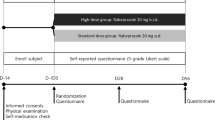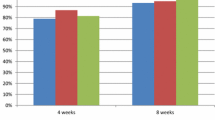Abstract
Objective
Rabeprazole, a new proton pump (H+, K+-ATPase) inhibitor, is a consistently effective treatment for patients with gastro-oesophageal reflux disease (GORD). Most of the data, however, has been obtained from controlled trials. The present study was carried out to assess the effectiveness and tolerability of rabeprazole in actual conditions of use in everyday clinical practice.
Design and setting
This was a multicentre, observational, noncomparative, open-label, short-term study conducted in the outpatient clinics of 11 hospitals from a single country (Brazil).
Patients
Male and female patients over 18 years of age with endoscopically confirmed erosive/ulcerative oesophagitis (Savary-Miller classification) and moderate to severe heartburn as the predominant symptom were eligible. Patients received rabeprazole 20mg once daily in the morning for 4 or 8 weeks. Patients with endoscopically documented healing at week 4 exited the study at that point.
Results
92 patients were included in the intention-to-treat (ITT) group and 68 in the per-protocol (PP) group. At the end of the 4-week treatment period, daytime heartburn was present in 16.2% of patients, as compared with 97.1% at baseline (p < 0.001) and night-time heartburn in 10.3%, as compared with 77.9% at baseline (p < 0.001). All other symptoms of GORD (acid regurgitation, dysphagia, eructation, fullness, nausea, vomiting, epigastric pain) improved significantly after 4 weeks of rabeprazole treatment. The healing rate of erosive/ulcerative oesophagitis was 70.6% in the PP analysis and 69.6% in the ITT analysis after 4 weeks of treatment. At 4 or 8 weeks, the healing rate in the PP group was 78.3% for grade I oesophagitis, 91.7% for grade II, 60% for grade III, and 40% for grade IV. According to diary card information, most patients obtained marked relief of heartburn within the first 3 days of treatment and reduction in the need for supplemental antacids within the first 5 days. A total of 18 adverse events occurred in 17 (18.5%) patients, with a ‘possible’ relationship to the use of rabeprazole in only four cases. Withdrawal of the medication because of adverse events was not necessary.
Conclusions
In this non-comparative, open-label, short-term study, rabeprazole 20mg once daily has shown clinical effectiveness in healing oesophageal lesions and in reducing the frequency and intensity of heartburn associated with erosive/ ulcerative oesophagitis in patients with GORD. Rabeprazole was also well tolerated.





Similar content being viewed by others
Notes
1Tradenames are used for product identification only and do not imply endorsement.
References
Freston JW, Malagelada JR, Petersen H, et al. Critical issues in the management of gastroesophageal reflux disease. Eur J Gastroenterol Hepatol 1995; 7: 577–86
Laurent AL, Merritt GJ, Setoyama T, et al. Rabeprazole: pharmacokinetics and safety in the elderly. Clin Geriatr 1999; 7: 27–33
De Vault KR. Current management of gastroesophageal reflux disease. Gastroenterologist 1996; 4: 24–32
Lambert R. Current practice and future perspectives in the management of gastro-oesophageal reflux disease. Aliment Pharmacol Ther 1997; 11: 651–62
Johnson DA. Medical therapy of GERD: current state of the art. Hosp Pract 1996; 31: 135–48
Klinkenberg-Knol EC, Festen HPM, Meuwissen SGM. Pharmacological management of gastro-oesophageal reflux disease. Drugs 1995; 49: 695–710
Sanders SW. Pathogenesis and treatment of acid peptic disorders: comparison of proton pump inhibitors with other antiulcer agents. Clin Ther 1996; 18: 2–34
Mears JM, Kaplan B. Proton pump inhibitors: new drugs and indications. Am Fam Physician 1996; 53: 285–92
Sandmark S, Carlsson R, Fausa O, et al. Omeprazole or ranitidine in the treatment of reflux esophagitis: Results of a doubleblind, randomized, Scandinavian multicenter study. Scand J Gastroenterol 1988; 23: 625–32
Dent J, Yeomans ND, Mackinnon M, et al. Omeprazole v ranitidine for prevention of relapse in reflux oesophagitis: a controlled double blind trial of their efficacy and safety. Gut 1994; 35: 590–8
Chiba N. Proton pump inhibitors in acute healing and maintenance of erosive or worse esophagitis: a systematic overview. Can J Gastroenterol 1997; 11(Suppl B): 66B–73B
Klinkenberg-Knol EC. Festen HPM, Jansen JBMJ, et al. Longterm treatment with omeprazole for refractory reflux esophagitis: efficacy and safety. Ann Intern Med 1994; 121(3): 161–77
Prakash A, Faulds D. Rabeprazole. Drugs 1998; 55: 261–7
Rabeprazole (Pariet®). Product monograph 2nd ed. Janssen-Cilag, 2000
Langtry HD, Markham A. Rabeprazole. A review of its use in acid-related gastrointestinal disorders. Drugs 1999; 58: 725–42
Cloud ML, Enas N, Humphries TJ, et al. Rabeprazole in treatment of acid peptic disease: results of three placebo-controlled dose-response clinical trials in duodenal ulcer, gastric ulcer, and gastroesophageal reflux disease (GERD). Dig Dis Sci 1998; 43: 993–1000
Williams MP, Sercombe J, Hamilton MI, et al. A placebo-controlled trial to assess the effects of 8 days of dosing with rabeprazole versus omeprazole on 24-h intragastric acidity and plasma gastrin concentrations in young healthy male subjects. Aliment Pharmacol Ther 1998; 12: 1079–89
Robinson M, Maton PN, Rodriguez S. Effects of oral rabeprazole on oesophageal and gastric pH in patients with gastro-oesophageal reflux disease. Aliment Pharmacol Ther 1997; 11: 973–80
Humphries TJ, Merritt GJ. Review article: drug interactions with agents used to treat acid-related disease. Aliment Pharmacol Ther 1999; 13Suppl 3: 18–26
Hoyumpa AM, Trevino-Alanis H, Grimes I, et al. Rabeprazole: pharmacokinetics in patients with stable, compensated cirrhosis. Clin Ther 1999; 21: 691–701
Lanza F, Dev Bardhan K, Perdomo C, et al. Efficacy of rabeprazole once daily for acid-related disorders. Dig Dis Sci 2001; 46: 587–96
Dekkers CPM, Beker JA, Thjodleifsson B, et al. Double-blind, placebo-controlled comparison of rabeprazole 20 mg vs omeprazole 20 mg in the treatment of erosive or ulcerative gastrooesophageal reflux disease. Aliment Pharmacol Ther 1999; 13: 49–57
Delchier JC, Cohen G, Humphries TJ. Rabeprazole, 20 mg once daily or 10 mg twice daily, is equivalent to omeprazole, 20 mg once daily, in the healing of erosive gastroesophageal reflux disease. Scand J Gastroenterol 2000; 35: 1245–50
Caos A, Moskovitz M, Dayal Y, et al. Rabeprazole for the prevention of pathologic and symptomatic relapse of erosive or ulcerative gastroesophageal reflux disease. Rabeprazole Study Group. Am J Gastroenterol 2000; 95: 3081–8
Thjodleifsson B, Beker J, Dekkers C, et al. Rabeprazole versus omeprazole in preventing relapse of erosive or ulcerative gastroesophageal reflux disease: a double-blind, multicenter, European trial. Dig Dis Sci 2000; 45: 845–53
Caro JJ, Salas M, Ward A. Healing and relapse rates in gastroesophageal reflux disease with the newer proton-pump inhibitors lansoprazole, rabeprazole, and pantoprazole compared with omeprazole, ranitidine, and placebo: evidence from randomized clinical trials. Clin Ther 2001; 23: 998–1017
Delchier JC, Cohen G, Humphries TJ, et al. Rabeprazole is comparable in efficacy to omeprazole in erosive GERD and provides more rapid heartburn relief [abstract]. Gut 1999; 45SupplV: A41
Camacho F, Perdomo C, Jokubaitis L, et al. Rabeprazole provides better heartburn relief compared to omeprazole in the first 3 days and 7 days of treatment, [abstract]. 65th Annual Meeting of the American College of Gastroenterology, 13–18 October 2000, New York, USA
Siddique R, Sloan S, Bhattacharjya A, et al. Rabeprazole relieves symptom distress in patients with non-erosive gastrooesophageal reflux disease [Abstract]. Gut 2000; 47Suppl III: A61
Breiter J, Birbara C, Niecestro R, et al. Rabeprazole prevents recurrence of pathology and symptoms in patients with healed erosive or ulcerative gastroesophageal reflux disease [abstract]. Gastroenterology 1999; 116: A128
Robinson M. New-generation proton pump inhibitors: overcoming the limitations of early-generation agents. Eur J Gastroenterol Hepatol 2001; 13Suppl 1: S43–7
Andersson T, Hassan-Alin M, Hasselgren G, et al. Pharmacokinetic studies with esomeprazole, the (S)-isomer of omeprazole. Clin Pharmacokinet 2001; 40: 411–26
Dean BB, Siddique RM, Tamashita BD, et al. Cost-effectiveness of proton-pump inhibitors for maintenance therapy of erosive reflux esophagitis. Am J Health Syst Pharm 2001; 58: 1338–46
Acknowledgements
This study was financially supported by Janssen Cilag Brazil, São Paulo, Brazil. We thank Dr Marta Pulido for editing the manuscript and for editorial assistance, and Ms Sofia Yuki Miyakoshi for her contribution in the statistical analysis of data.
Author information
Authors and Affiliations
Rights and permissions
About this article
Cite this article
de Freitas, J.A. Effectiveness and Tolerability of Rabeprazole 20mg as Once-Daily Monotherapy in Treatment of Erosive or Ulcerative Gastro-Oesophageal Reflux Disease. Clin. Drug Investig. 22, 279–289 (2002). https://doi.org/10.2165/00044011-200222050-00002
Published:
Issue Date:
DOI: https://doi.org/10.2165/00044011-200222050-00002




